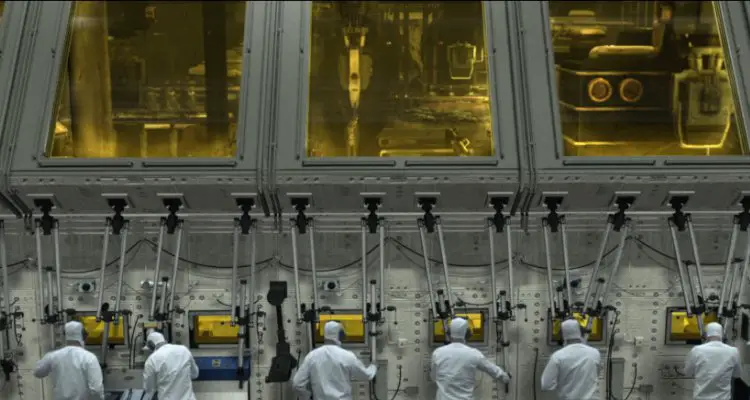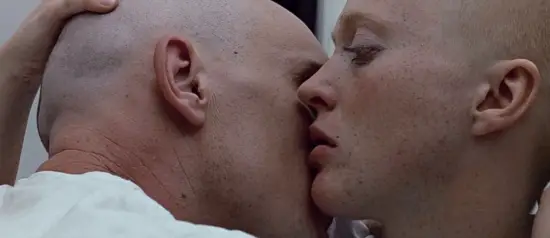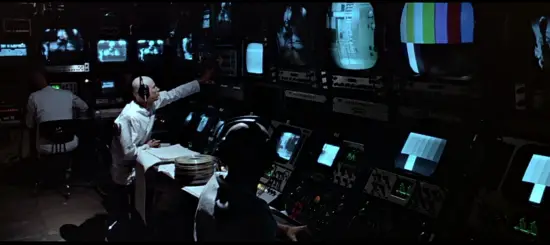THX 1138 Is The Foundation of Dystopian Science Fiction Film

Manon de Reeper is the founder and CEO of Film…
Most people I tell about THX 1138 have never heard of it before. When I tell them it was George Lucas’ first feature-length film, they look at me dumbfounded. Though, if you’d have told me about THX a few years ago, my reaction would probably have been the same. I found a gem in THX – some would not agree with me, but I feel I’m lucky I found out about it. The story of THX 1138 is basically all you know from Brave New World and 1984 mixed into one movie. It has the compulsory use of sedatives and a totalitarian government that suppresses its people in every way possible, basically – of course, all sexual behavior is forbidden. Most people live their lives happily, but not LUH, THX’s assigned roommate. She has stopped taking her sedatives and has fallen in love with THX, and she convinces him to stop taking the sedatives too. He is uncertain, but does as she asks. They start a very pure, touching (literally as well as figuratively) relationship, and while they try to stay under the radar and try to go about their lives as usual, their new found love is soon brutally ended by the government, which has surveillance cameras even in people’s houses. The rest of the movie is about THX’s attempt to find LUH and to escape the system, and on this journey he meets people and creatures that you could easily call magical or otherworldly. The plot may seem very familiar to you – already in 1971 it wasn’t very original. Brave New World and 1984 had both been released long before that time, and by now, this story, this plot, has been cinematized a thousand times. But the plot isn’t really what makes THX 1138 so special.

One of the things that immediately struck me about THX 1138 is the extreme starkness of the world. In the 70s, most science fiction was very vivid, colorful. Think of Logan’s Run (1976), A Clockwork Orange (1972), Soylent Green (1973) or the first Star Wars (1977), for that matter. Even if the colors in some of these movies were toned down a little (as in Soylent Green), compared to THX, they are as bright and colorful as rainbows. THX 1138 truly stood out in that, perhaps it is a reason it did not appeal to everyone at the time. I suspect that a lot of modern day sci-fi makers have (indirectly?) been inspired by the looks of THX 1138. The whiteness and abstractness of the setting is what you see more often in newer sci-fi’s, or, for instance, the all white costumes, the bald heads. The most recent example I can think of is Cloud Atlas (2012), where the advanced people in the very far future are too dressed in all white. Robert Duvall and Maggie McOmie make an interesting couple, they are very convincingly awkward. In the documentary about this movie, Robert Duvall admitted to feeling quite uncomfortable with the sex scenes – maybe he funneled it into the scenes. But this is definitely not a problem: for people who have all their lives been taught that two people being together is wrong, that having emotions is wrong, their odd reactions and clumsiness just adds to the picture, making it purer. I have read reviews where critics strongly criticized and objected to George Lucas’ way of editing. Unfair of course to the reviewers in the 70s, but with having seen many new(er) movies, I found THX 1138 amazingly progressive. The editing is choppy at times, yes, but the images that sometimes flash over the screen for just a second or two are often illuminating – they tell a lot about the world of THX. Some of the shots shown don’t even make sense, but in my opinion, this again only adds to the strangeness, the otherworldliness of the setting.

THX 1138 requires a lot of thinking and a vivid imagination. It’s not an easy movie, which may be why it has been rejected by critics so often. Lots of the culturally based behaviors and the norms and values of the people are not explained at all, and most of what is shown is very abstract or just very far from what we know, at least, in the Western world. But honestly, this is something I can only appreciate – I really like it when movies make people think. Before I drag on for too long… Let’s move on to the Crime Factor.
Discussion
Fascinating in THX 1138 is the scene where THX’s sentence is carried out: the prosecution, a kid that can’t be older than 14 years of age, pleads for “immediate destruction” of THX, but eventually, they settle on “conditioning and detention”. The conditioning here is reminiscent of A Clockwork Orange, where Alex is sent to be cured of his “illness” that is criminal behavior as well, though the approach is different. THX is touched with rods that zap him with electricity. He’s also controlled from afar, a result of the conditioning, I would guess. That scene, where they experiment with his conditioning, you hear two men discussing all sorts of casual, random matters, occasionally mentioning what we see happening (THX suffering under the control, sometimes in seemingly excruciating pain), would suggest that they merely see him as an animal which behavior needs to be changed no matter the means – no, actually, they’ve already been numbed to the means. What is also extremely interesting is the idea of the endlessly white space as a prison. The whiteness causes everyone lose any sense of direction. The people we see in this prison are all quite mad, and I would imagine such whiteness would eventually drive one crazy. In any case, the idea of this whiteness as a giant cell, where the authority has unlimited observing power, it is much like a perfect panopticon, driven to its most extreme form.

A last quote to give you a feel of the attitude of the government in THX 1138…
“If you feel you are not properly sedated, call 348-844 immediately. Failure to do so may result in prosecution for criminal drug evasion.”
I’ll stop now. As you can tell I’m very excited about this movie – plus I’ve analyzed it so much I could probably write an entire book about it. I think it’s great, though the first time I watched it I was a lot less impressed than the second time. There are so many details in this movie that it can easily overwhelm you, and if you’ve never seen it before… Don’t immediately judge it if it’s not exactly to your taste. Mull it over a little. Consider watching it again, maybe even after a few weeks. Have you seen THX 1138? What is your opinion about it? If you haven’t seen it yet, does it sound interesting to you? Would you want to see it? Do you think THX 1138 would be received better by today’s generation, if it were released today?
Does content like this matter to you?
Become a Member and support film journalism. Unlock access to all of Film Inquiry`s great articles. Join a community of like-minded readers who are passionate about cinema - get access to our private members Network, give back to independent filmmakers, and more.
Manon de Reeper is the founder and CEO of Film Inquiry, and a screenwriter/producer. Her directorial debut, a horror short film, is forthcoming in 2021.













